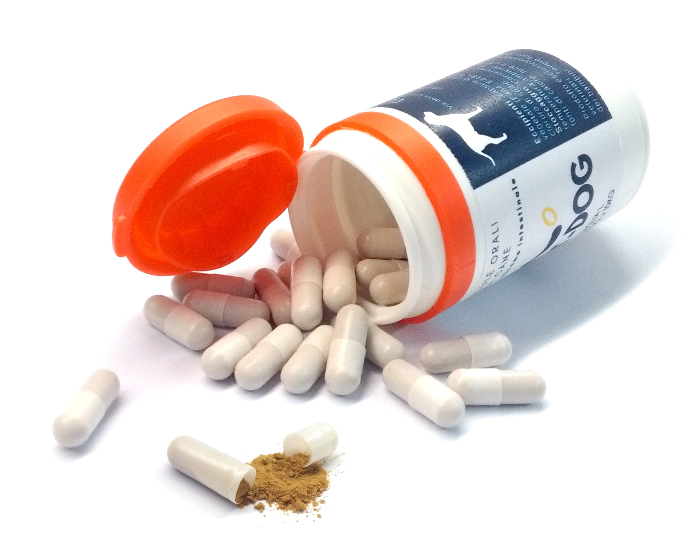Fecal microbiome transplant

Safe, simple, effective, and natural
Fecal transplantation (FMT) naturally counteracts the dysbiosis typically present in chronic enteropathies, repopulating and rebalancing the intestinal microbiome.
FMT made with freeze-dried capsules is simple and effective: the capsules are easy to transport, store and administer, and over 80% of chronic enteropathic dogs and cats respond positively.
Pet FMT Project
EuBiome proposes the participation in the Pet FMT Project. In this context, veterinarians can offer owners of enteropathic dogs and cats a simple and safe solution, without wasting time managing the complex production process of microbiome transplantation.
But there is more!
Participating means being part of a unique project in Europe, of a network that produces and exchanges knowledge and helps to understand the role of the microbiome in chronic enteropathies and make fecal transplantation ever more effective.
Over 70 vets have joined already!
Procedure for participation in the Pet FMT project
Agreement
Request and sign the project agreement
Consent
Inform and have the owner sign the consent
Data
Collect and send pet data
Payment
Buy the FMT Kit
- Request the documentation to partecipate.
- Sign the agreement between the veterinarian and EuBiome (once).
- Identify the patient eligible for transplant.
- Inform the owner.
-
Collect informed consent.
- Request for the FMT Kit.
- Collect the animal's data.
- Make payment for the FMT kit.
- Give the FMT kit to the owner at the price you think is right.
- Give instruction on how to use it.
- When finished, do the follow up visit.
- Tell us the data.
-
If you want, participate in the dissemination of the experience and data analysis.
FAQ
- Who are the recipients?
Dogs and cats with chronic enteropathy symptoms for at least 3 weeks. - Are there any exclusions?
Enteropathies due to parasites, neoplasms, endocrinopathies, dysphagia, age less than 4 months. - Is FMT the last resort?
No, fecal transplantation aims to rebalance the microbiome. If organs and tissues are compromised, FMT can hardly make a difference. - When to do FMT then?
More and more veterinarians suggest using fecal transplantation after the failure of dietary trials, possibly accompanied by drugs that reduce the inflammatory state. The sooner you intervene when dysbiosis is suspected, the better. - What does the FMT kit contain?
30 capsules of lyophilized microbiome from healthy animals and 2 collection kits for microbiome analysis.At the end of the cycle, the FMT Report is returned, which shows the situation of the microbiome before and after the transplant and the possible contribution of the donor.Ask for a sample transplant report.. - How are the capsules administered?
One capsule a day orally, with a tidbit if needed. - Can the administration be stopped?
Yes, you can suspend and resume later. The goal of transplantation in chronic enteropaths is to rebalance the microbiome, which must be accompanied by a general rebalancing of the organism, therefore the transplant must be seen in a long-term perspective. - How are the capsules stored?
At room temperature protected from light and humidity. - Are there any side effects?
Rarely diarrhea, vomiting, flatulence, abdominal pain that resolve on their own in 24-48 hours, in case suspend for 3-4 days. - Is one treatment enough?
It depends on the case, there are situations in which there is an improvement immediately, others in which it arrives even after the end of the transplant; the improvement may be definitive or there may be relapses that require more cycles to arrive at a stable resolution of symptoms. In some cases, no improvement in symptoms is seen. Today no one can say a priori how long it will take, how many treatments will be needed, but a light can be glimpsed (see the paper on ulcerative colitis in humans in which a treatment with capsules has been done for 56 consecutive weeks), and the Pet FMT Project can make its contribution.
Mini guida FMT: "10 cose che devi sapere sul trapianto fecale in canie gatti", un PDF che raccoglie i principali concetti del trapianto fecale.
Casi clinici FMT: link ai webinar in cui veterinari che hanno utilizzato il trapianto fecale riportano la loro esperienza.
Report FMT: esempio di report di trapianto fecale
Per iniziare: ricevi la documentazione per aderire al progetto Pet FMT e accedere al trapianto fecale
Chiamami: lascia il telefono e indica nelle note le tue preferenze di orario.
Over 70 vets have already joined!
Join us and help raise knowledge about fecal transplantation.